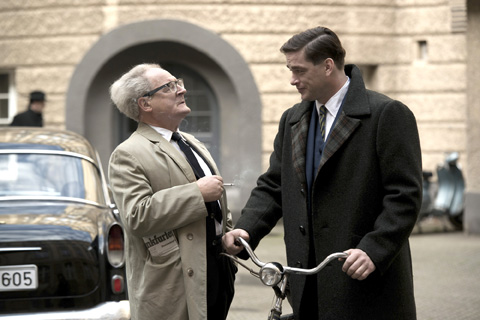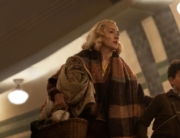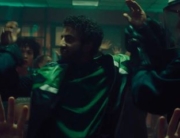The People vs. Fritz Bauer is the third fictionalized version in three years of how a German Jewish, gay, ex-political prisoner, and prosecutor fought East and West German bureaucracies full of Nazi sympathizers to bring war criminals to court in the 1960s—in Germany and in Israel. Anchored by Burghart Klaussner’s ferocious lead performance, Lars Kraume’s version recently won more German Film (Lola) than Giulio Ricciarelli’s version of these events, Labyrinth of Lies, did last year. (People won four, including for best film and director.)
The earlier internationally distributed film quite oddly and inaccurately reduced Bauer’s role in these legal battles to a distant adviser. The focus instead was on a fictional young attorney’s growing awareness about German culpability in crimes against humanity and the duplicitous elite’s 20-year silence since the Allies’ Nuremberg trials ended in 1949. The new film’s director portrays much more of Bauer’s persistence and influence, including convincing the Mossad to capture and try Adolf Eichmann. Bauer’s stubborn and wily determination, though, is put within the context of the naïve experiences of yet another fictional young lawyer, Karl Angermann (Ronald Zehrfeld), who, over several long scenes, follows sexy performer Victoria (Lilith Stangenberg) into a gay/trans Weimar-esque nightclub.
Kraume and co-screenwriter Olivier Guez, journalist author of The Impossible Return: A History of the Jews in Germany Since 1945 (2009), which is not available in English, conducted considerable research. They hunted down the police report of Bauer’s dalliance with a homosexual prostitute during his exile from the Nazis in Denmark. This is the sole suggestion of his orientation in any biographical reference. Here, it is presumed to be why Bauer knows to advise his closeted protégé on how to get around the Nazis’ notorious Paragraph 175 of the Civil Code criminalizing homosexual acts, which was still in effect. (The statute’s wording was actually not much different than similar laws in the United Kingdom, parts of the United States, and elsewhere at this time.)
But Bauer went around the legal establishment (still full of Nazi judges) as the only figure in the postwar government to publicly rail against the old guard’s intransigence in the nascent democracy he cherished, as seen in the opening footage from one of his famous TV interviews. These prominent appearances brought him death threats, the admiration of the young generation (inspiring the likes of the future members of The Baader Meinhof Complex), and unique, trusted leads from journalists and international Nazi-hunters as to where high-level Nazis were hiding in plain sight.
In an exciting spy novel-like cloak and file operation, Bauer is so aware of the forces aligned against him that he runs his own top secret investigation to confirm the credible sighting of Eichmann in Argentina. He personally lobbies the Israeli government to transport Eichmann directly to Jerusalem for trial by emphasizing Eichmann’s supervision of the Final Solution. He informs one colleague of his plans, who warns Bauer that he’s committing treason. Ironically, Bauer first came to wide attention by gaining the posthumous rehabilitation of the Hitler assassination plotters who were executed for treason.
Bauer follows the news of the sensational Eichmann trial by enthusiastically organizing the legal staff to conduct what will become Germany’s first groundbreaking effort to try Germans for their crimes during the Third Reich, as detailed in Verdict on Auschwitz: The Frankfurt Auschwitz Trial 1963-1965. He recruits the fictional Angermann, who, now compromised with the performer, has to decide if he will face his own moral dilemma as courageously as his mentor.
Among the three versions of Bauer’s heroism, Stephan Wagner’s The General, a movie broadcast on German public television earlier this year and recently shown at the various Goethe Instituts around the world, has fewer distracting fictional characters. In New York, The People vs. Fritz Bauer was accompanied by a series of films titled “Enemy Territory–Fritz Bauer and Postwar Germany,” echoing his famous quote, “When I leave my office, I’m entering enemy territory.” The People vs. Fritz Bauer well captures his justified paranoia when it explores his fierce commitment to justice.

















Leave A Comment